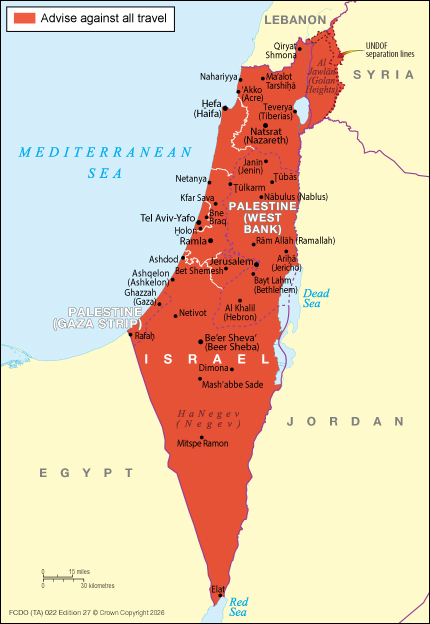Palestine
Warnings and insurance

FCDO advises against all travel to Israel and Palestine.
Find out more about why FCDO advises against travel.
Register your presence
Let the UK government know you’re in Palestine, register your presence if you’re in Palestine for further updates.
Regional escalation
Regional escalation poses significant security risks and has led to travel disruption.
Israeli airspace has now closed.
British nationals should:
- read If you’re affected by a crisis abroad - GOV.UK. This includes guidance on “how to prepare for a crisis” with suggestions on what you might include in your emergency supplies and “what to do in a crisis”
- Follow advice from the local authorities and sign up to receive information and alerts. Visit Israel’s Home Front Command
- sign up to FCDO Travel Advice email alerts
- monitor local and international media for the latest information
- stay away from areas around security or military facilities
- keep your departure plans under review, and ensure your travel documents are up to date
- if you are advised to take shelter, Israel’s Home Front Command provides guidance on how to find a protected space. The best option is a residential protected space (Mamad, Mamak or Maman) or a communal shelter. If that is not possible, choose a stairwell without windows and exterior walls and stay at its centre
If you are in Israel and Palestine
We have taken the precautionary measure to temporarily move some of our staff and their dependents from Tel Aviv to another location within Israel. Our Embassy continues to operate as normal.
The situation could escalate quickly and poses significant risks. Regional tensions may cause international borders (air and land) to close.
If you are in Israel and Palestine, be aware that whilst the frequency of missile and drone attacks has decreased, there is still a risk of rocket and drone attacks throughout Israel. There is a risk of shrapnel from intercepted missiles falling across Israel and Palestine, and possible disruption at Ben Gurion airport in Tel Aviv.
Political tension can cause demonstrations and clashes around anniversaries and significant events.
Keep up to date through local media and follow the instructions of Israeli Home Front Command. To find these:
-
visit the Israeli Home Front Command website (available in Israel only)
-
call 104 if you are in Israel
Before travelling within Israel or Palestine, check the local measures in place, that roads are open and, where appropriate, that scheduled train and bus services are operating.
Travel within or out of Israel or Palestine is at your own risk. You are encouraged to follow the advice of local authorities, for example on which routes are open or when to take shelter.
Leaving Gaza
Border crossings out of Gaza have been closed to civilians and general traffic since the Israeli military took control of the Rafah crossing on 6 May 2024. Consular support is not available from within Gaza. If you are a British national in Gaza who wants to leave Gaza, you should make contact with us as soon as possible. There are currently no exit routes available for foreign nationals to depart Gaza independently. We are working with the Israeli, Palestinian and other authorities in the region to help British nationals leave via safe routes.
If you are a UK visa holder who meets all of the following criteria, you can contact us to request support to leave Gaza if:
-
you have a spouse/partner or a child aged 17 or under currently living in the UK, and
-
you hold valid permission to enter or remain in the UK for longer than 6 months
Help from other organisations
Keep up to date with local travel advice through local news outlets and international outlets like the Access Coordination Unit.
Before you travel
No travel can be guaranteed safe. Read all the advice in this guide and any specific travel advice that applies to you:
- women travellers
- disabled travellers
- LGBT+ travellers
- solo and independent travel
- volunteering and adventure travel
Travel insurance
If you choose to travel, research your destinations and get appropriate travel insurance. Insurance should cover your itinerary, planned activities and expenses in an emergency.
About FCDO travel advice
FCDO provides advice about risks of travel to help British nationals make informed decisions. Find out more about FCDO travel advice.
Get travel advice updates
Sign up to get email notifications when this travel advice is updated.
Follow FCDO: